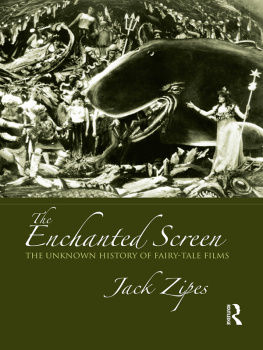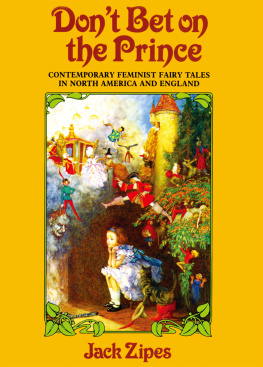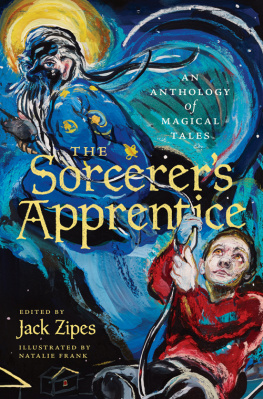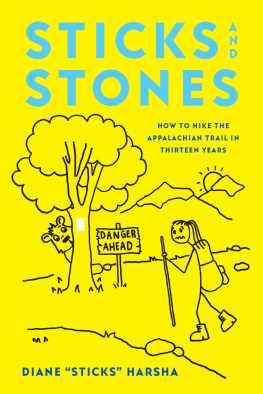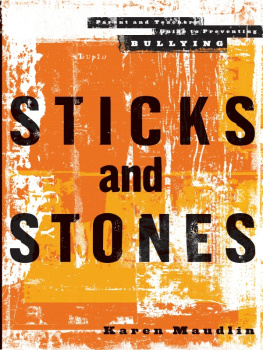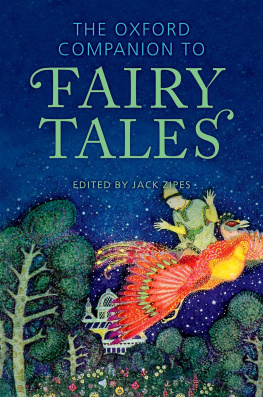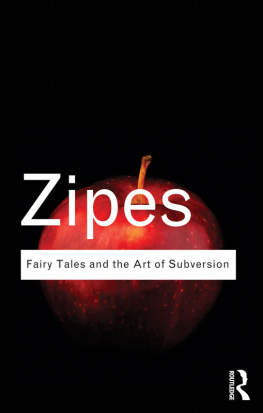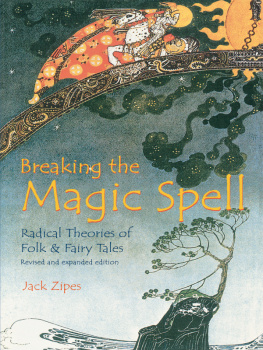First published in 2001 by
Routledge
711 Third Avenue
New York, NY 10017
Published in Great Britain by
Routledge
2 Park Square, Milton Park
Abingdon, Oxon OX14 4RN
Routledge is an imprint of the Taylor & Francis Group, an informa business
Copyright 2001 by Jack Zipes
All rights reserved. No part of this book may be reprinted or reproduced or utilized in any form or by any electronic, mechanical, or other means, now known or hereafter invented, including photocopying and recording or in any information storage or retrieval system, without permission in writing from the publishers.
Library of Congress Cataloging-in-Publication Data
Zipes, Jack David.
Sticks and stones: the troublesome success of childrehe troublesome success of children's literature from Slovenly Peter to Harry Potter / Jack Zipes.
p. cm.
Includes bibliographical references and index.
ISBN 0-415-92811-7 (acid-free paper)
1. Children's literature-History and criticism. 2. Children's literature, American-History and criticism. I. Title.
| PN1009.A1 Z57 2000 |
| 809.8928209045-dc21 | 00-032318 |
T he more we invest in children,
the more we destroy their future. There is no
way out of the paradox that we have created,
unless we reconsider our investment. For
twenty-five years I have been engaged in writing
about children's literature and culture. I have always written with the hope that childhood might be redeemed, not innocent childhood, but a childhood rich in adventure and opportunities for self-exploration and self-determination. Instead, I witness a growing regulation and standardization of children's lives that undermine the very sincere concern parents have for their young. It appears that my hope for greater freedom and creativity in children's lives will be disappointed. Yet I have not abandoned this hope. I have become more sober about changing how we socialize children, even though the way we do it is nothing short of barbaric.
This may be a shocking observation, but it isn't new. Theodor Adorno, whose works have continually inspired my thinking, began making the connection between civilization and barbarianism well over fifty years ago. Appalled by the totalitarian practices of Nazi Germany, Adorno came in 1939 to live in the United States, where he wrote his famous book Dialectic of the Enlightenment (1944) with Max Horkheimer. Instead of rejoicing in the freedom of America, he was horrified to find that there were totalitarian tendencies in all spheres of life that could lead to a degradation of culture and diminished autonomy for individuals. He continually wrote about the culture industry's sophisticated and subtle mechanisms to limit our critical thinking and warned that we had created myths about reason and democracy that blinded us to the untruths which we celebrated through rationalization and ethical posturing.
Not everything that Adorno predicted in his writings until his death in 1969 has come true. But he has certainly shed light on the contradictory way we treat our children, even though he never wrote about the particular situation of children within the culture industry. All we have to do is look at the vocal complaints about the mass media and children's culture to see the relevance of his theories. It may be a far cry to link Adorno with the gifted American entertainer Steve Allen, but I was reminded of how much they have in common when I read a full-page ad in the Minneapolis Star Tribune of February 21, 2000. Parents Grandparents Families, Allen's ad began, This is for you. TV is leading children down a moral sewer. Now you and I can stop it. Are you as disgusted as I am at the filth, vulgarity, sex, and violence TV is sending into our homes? Are you as outraged as I am at how TV is undermining the morals of children encouraging them to have pre-marital sex encouraging lack of respect for authority and crime and shaping our country down to the lowest standards of decency? Well now you and I can end it. Yes we can, actually and literally. We can do it by reaching the TV sponsors whose ad dollars make it possible.
Though Adorno would never have been caught dead in a million years playing an activist role in opposing the culture industry, he would have certainly grasped and supported Allen's rage. In contrast to Allen, he would not have asserted that family values could easily be restored by exercising pressure on TV sponsors. He would have tried to understand how barbaric conditions have continued to persist because of our faith in the myth of Enlightenment.
What is most disturbing today is that we use rational methods to cultivate the tastes and values of the young in all kinds of educational, religious, and cultural institutions that are predicated on corporate practices and goals. Everything we do to, with, and for our children is influenced by capitalist market conditions and the hegemonic interests of ruling corporate elites. In simple terms, we calculate what is best for our children by regarding them as investments and turning them into commodities. Such rationalized practices lead to irrational if not vicious behavior. Success and justice are thus based on irrational and commodified relations. Children are expected to sort out the contradictions that are inevitable and intolerable in our society, and our vested interests drive them forward into hysteria, violence, and bewilderment.
American society is a wilderness. The wilderness is not only a lonely and lovely place, but it is dangerous because wild things are out there, bent on survival and ready to devour you. People are wild because they are controlled too much, cooped up, even though they appear free to roam wherever they desire. But they do not know their desires. We do not know our desires. They are packaged for us and induced. This induction forms part of the civilizing process that paradoxically produces the wildness and bewilderment in us.
Total control of our natural and induced desires seems to offer hope. So it is no surprise to me to see totalizing tendencies in all aspects of society. The totalitarian nature of the former communist states in Eastern Europe and the Far East were vapid in comparison with the capitalist conglomerates that penetrate our lives constantly in the name of globalization. Today we operate on ourselves to improve our bodies and minds in keeping with totally new images of ideal societies based on degenerate utopias. We seek to improve our children's lives by getting rid of moral sewers and by constructing purification systems that confine them. We do not realize how much our purification systems actually produce the waste and turpitude that we complain about.
These sobering misgivings of mine have fortunately been offset by personal experiences of resistance to totalizing forces that I have had in North America and Europe. Human beings are devious. We know and feel the hypocrisy of compliance with irrational norms. We engage in all sorts of subversive practices in the home, on the streets, and at work. We desperately want to save our children from the future that we have planned for them. We engage social and political forces on the battlefield of children's bodies and minds.



